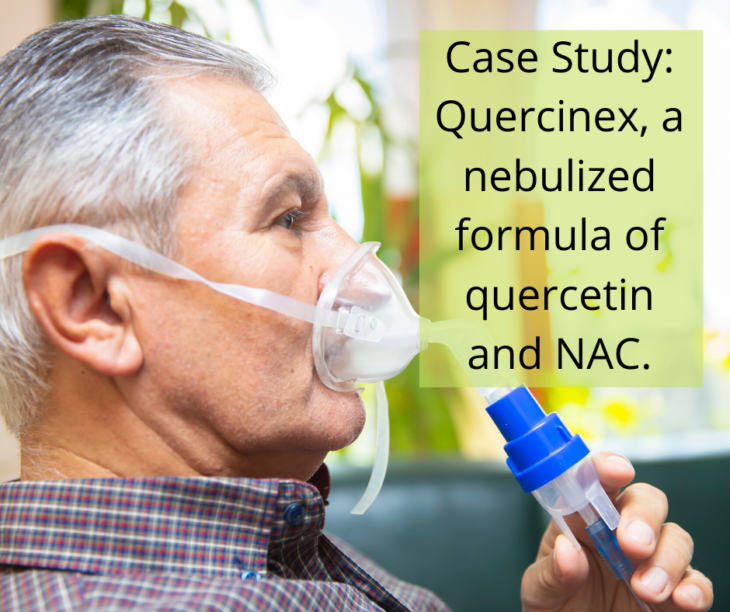A new case study shows remarkable results for treating COVID19 using nebulized Quercetin, a plant flavonoid often used for inflammation reduction and allergy symptoms, and NAC, short for N-acetyl cysteine, one of the three amino acids that are building blocks for glutathione.
“Following 30 minutes after each nebulization treatment, the patient experienced immediate deep breathing relief that lasted for multiple hours. Within the following 48 hours after the first treatment, respiratory symptoms continued to diminish and resolve quickly. Finally, post-treatment follow-up chest X-rays revealed no pulmonary fibrosis (scarring) and clear lung fields.”
This adds to the growing positive findings for these two supplements in treating COVID-19.
COVID-19 Patient with Multifocal Pneumonia and Respiratory Difficulty Resolved Quickly: Possible Antiviral and Anti-Inflammatory Benefits of Quercinex (Nebulized Quercetin-NAC) as Adjuvant
Robert Schettig, Trevor Sears, Matthew Klein, Ruth Tan-Lim, Ronald Matthias Jr., Christopher Aussems, Michael Hummel, Rory Sears, Zachary Poteet, Daniel Warren, John Oertle, Dino Prato. Envita Medical Center, Scottsdale, USA.
Abstract: Background: SARS-CoV-2 (COVID-19) is a viral pandemic with no current vaccine or effective treatment. Hydroxychloroquine and azithromycin are not without cardiovascular risk or complications, and these treatments can fail to aid in full recovery from COVID-19. As new treatments become approved for the pandemic, an inexpensive, non-toxic, and safe adjunctive therapy is needed. Case Presentation: A 59-year-old male presented with respiratory symptoms. Chest X-ray revealed classic indications of COVID-19 pneumonia. A PCR nasopharyngeal swab test confirmed a COVID-19 infection and hospital doctors prescribed Rocephin, azithromycin, and hydroxychloroquine. The patient was then prescribed Quercinex, a nebulized formula of quercetin-(cyclodextrin) (20 mg/mL) and N-acetylcysteine (100 mg/mL) three times daily for 14 days by physicians at Envita Medical Center for continued COVID-19 respiratory symptoms. Following 30 minutes after each nebulization treatment, the patient experienced immediate deep breathing relief that lasted for multiple hours. Within the following 48 hours after the first treatment, respiratory symptoms continued to diminish and resolve quickly. Finally, post-treatment follow-up chest X-rays revealed no pulmonary fibrosis (scarring) and clear lung fields. Conclusion: The Quercinex formula appeared to greatly alleviate the unresolved respiratory symptoms rapidly. Several mechanisms of the formula, namely antiviral and anti-inflammatory action, with direct administration via nebulizer to the deep lung tissue, could potentially explain the fast and complete recovery. We recommend that the Quercinex formula be considered for further clinical study as an adjuvant or on its own for COVID-19 and possibly other viral pulmonary conditions.

